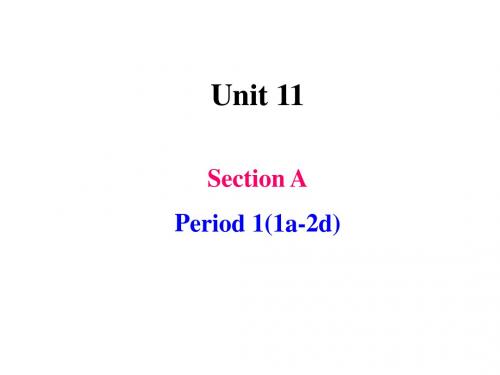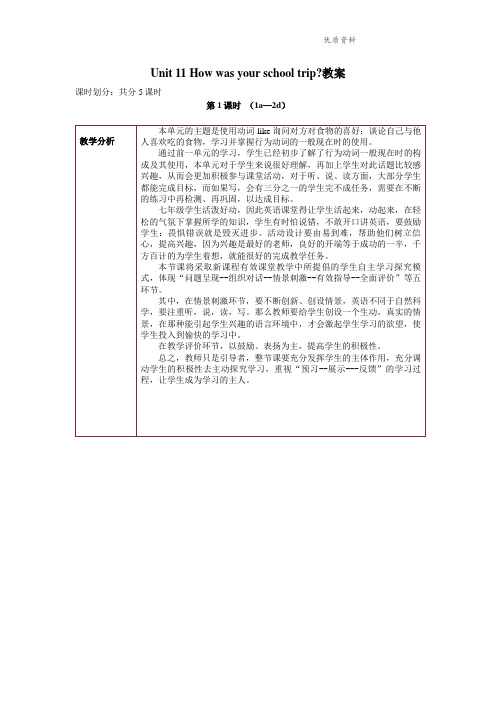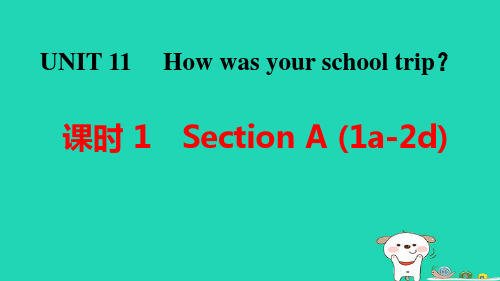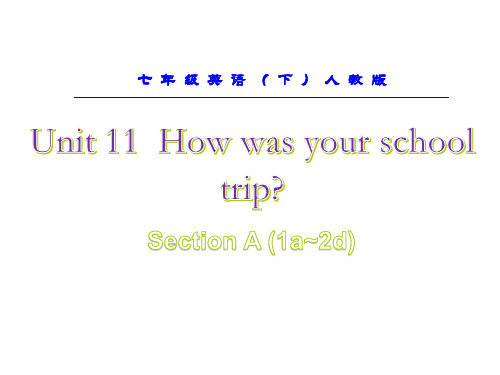人教版七年级英语下册Unit 11 第1课时(A 1a-2d)优质课件
合集下载
人教版七年级下教学课件:Unit 11

That girl likes to take photos of herself with her cell phone. 那个女孩喜欢用手t was an exciting day. 总之,这是令 人兴奋的一天。
All in all 相当于汉语中的“总的说来;总之;整 体上说”,用来对所阐述的内容进行概括性总结 及归纳。例如:
令人激动的 22. lovely adj. 可爱的 23. expensive adj. 昂贵的 24. cheap adj. 廉价的;便宜的
25. slow adj. 缓慢的;迟缓的 26. fast adv. & adj. 快地(的) 27. robot n. 机器人 28. guide n. 导游;向导 29. gift n. 礼物;赠品 30. everything pron. 所有事物;一切
13. yesterday adv. 昨天 14. flower n. 花 15. worry v. & n. 担心;担忧 16. luckily adv. 幸运地;好运地 17. sun n. 太阳 18. museum n. 博物馆
19. fire n. 火;火灾 20. painting n. 油画;绘画 21. exciting adj. 使人兴奋的;
All in all, I think you did a good job. 总的来说, 我认为你干得很好。
7. anything pron. (常用于否定句 或疑问句)任何东西;任何事物 8. grow v. 种植;生长;发育 9. farm n. 农场 v. 务农;种田 10. pick v. 采;摘 11. excellent adj. 极好的;优秀的 12. countryside n. 乡村;农村
All in all 相当于汉语中的“总的说来;总之;整 体上说”,用来对所阐述的内容进行概括性总结 及归纳。例如:
令人激动的 22. lovely adj. 可爱的 23. expensive adj. 昂贵的 24. cheap adj. 廉价的;便宜的
25. slow adj. 缓慢的;迟缓的 26. fast adv. & adj. 快地(的) 27. robot n. 机器人 28. guide n. 导游;向导 29. gift n. 礼物;赠品 30. everything pron. 所有事物;一切
13. yesterday adv. 昨天 14. flower n. 花 15. worry v. & n. 担心;担忧 16. luckily adv. 幸运地;好运地 17. sun n. 太阳 18. museum n. 博物馆
19. fire n. 火;火灾 20. painting n. 油画;绘画 21. exciting adj. 使人兴奋的;
All in all, I think you did a good job. 总的来说, 我认为你干得很好。
7. anything pron. (常用于否定句 或疑问句)任何东西;任何事物 8. grow v. 种植;生长;发育 9. farm n. 农场 v. 务农;种田 10. pick v. 采;摘 11. excellent adj. 极好的;优秀的 12. countryside n. 乡村;农村
人教新目标七年级英语课件:Unit 11 How was your school trip Section A-Period 1(1a-2d)

2d
Role-play the conversation.
1. quite adv. 相当;完全;十分;很 例如: She sings quite well. 她唱得非常好。
2. take与photo, picture 等词搭配时,表 示“拍摄;摄影”。表示“拍摄某 物或人”,则要在短语后面接介词 “of” 引入所拍摄的对象。例如: That girl likes to take photos of herself with her cell phone. 那个女孩喜欢用手机自拍。
rode a horse
Oct. 3rd
My National Day vacation activities
பைடு நூலகம்
fed chickens
Oct. 4th
My National Day vacation activities
talked with a farmer
Oct. 5th
My National Day vacation activities
√ What did you see? • ___
• ___ Did you learn anything?
• ___ √ Did you ask him any questions?
• ___ Did you grow any apples?
• ___ √ Do they grow apples?
Names Activities she/he did Carol Peter Eric
How was his/ her weekend?/ feeling boring/terrible/ busy/tired/bad good/wonderful/ fantastic
2021年人教版七年级英语下册Unit11 第1课时 (1a—2d)教案

其中,在情景刺激环节,要不断创新、创设情景,英语不同于自然科学,要注重听,说,读,写。那么教师要给学生创设一个生动,真实的情景,在那种能引起学生兴趣的语言环境中,才会激起学生学习的欲望,使学生投入到愉快的学习中。
在教学评价环节,以鼓励、表扬为主,提高学生的积极性。
总之,教师只是引导者,整节课要充分发挥学生的主体作用,充分调动学生的积极性去主动探究学习,重视“预习--展示---反馈”的学习过程,让学生成为学习的主人。
听说练习
18分钟
1a.Match the phrases with the pictures.
1b.Listen and circle the three things Carol did on her school trip in1a.
1c.Ask and answer questions about Carol’s school trip.
七年级学生活泼好动,因此英语课堂得让学生活起来,动起来,在轻松的气氛下掌握所学的知识,学生有时怕说错,不敢开口讲英语,要鼓励学生:畏惧错误就是毁灭进步。活动设计要由易到难,帮助他们树立信心,提高兴趣,因为兴趣是最好的老师,良好的开端等于成功的一半,千方百计的为学生着想,就能很好的完成教学任务。
本节课将采取新课程有效课堂教学中所提倡的学生自主学习探究模式,体现“问题呈现--组织对话--情景刺激--有效指导--全面评价”等五环节。
Q:Did he ride a horse?
A:No,he didn’t.
Q:Did he feed chickens?
A:Yes,he did. He fed chickens.
Q:Did you go to the zoo?
A:No,I didn’t. I went to a farm.
在教学评价环节,以鼓励、表扬为主,提高学生的积极性。
总之,教师只是引导者,整节课要充分发挥学生的主体作用,充分调动学生的积极性去主动探究学习,重视“预习--展示---反馈”的学习过程,让学生成为学习的主人。
听说练习
18分钟
1a.Match the phrases with the pictures.
1b.Listen and circle the three things Carol did on her school trip in1a.
1c.Ask and answer questions about Carol’s school trip.
七年级学生活泼好动,因此英语课堂得让学生活起来,动起来,在轻松的气氛下掌握所学的知识,学生有时怕说错,不敢开口讲英语,要鼓励学生:畏惧错误就是毁灭进步。活动设计要由易到难,帮助他们树立信心,提高兴趣,因为兴趣是最好的老师,良好的开端等于成功的一半,千方百计的为学生着想,就能很好的完成教学任务。
本节课将采取新课程有效课堂教学中所提倡的学生自主学习探究模式,体现“问题呈现--组织对话--情景刺激--有效指导--全面评价”等五环节。
Q:Did he ride a horse?
A:No,he didn’t.
Q:Did he feed chickens?
A:Yes,he did. He fed chickens.
Q:Did you go to the zoo?
A:No,I didn’t. I went to a farm.
七年级英语下册Unit11课时1SectionA(1a_2d)课件pptx新版人教新目标版

一
二
三
四
五
六
五、补全对话。 A. I saw quite a lot. B. No, I didn't. C.How was your school trip yesterday? D. What else did you do? E. Did you feed any chickens?
一
二
三
四
UNIT 11 How was your school trip?
课时 1 Section A (1a-2d)
一、根据句意及汉语提示完成单词。 1.[2023·沧州期末改编] He went to Uncle Sam’s farm
(农场)and saw many sheep there. 2. We grew (种植)many apple trees near our house last year. 3. There isn’t anything (任何东西)in the box. It’s empty.
五
六
A: Hi, Eric. 21. C B: It was great! A: DidAy.oIusgaowtoqutihtee zaoloo?t. B: 22. B. NBo, I Idiwdenn'tt. to a farm. Look! Here are my photos.
A: DidCy.oHuosweewaansyycoouwr ss?chool trip yesterday? B: Yes,DI.dWidh.a2t3e.lse Adid you do? A: DidEy.oDuirdidyeoua hfeoerdsea?ny chickens?
your
人教版PEP英语七年级下册Unit11 第一课时SectionA(1a-2d)优秀课件

IV.根据提示完成句子 1.I usually g_e_t_(get) up at 6:30 in the morning. Today 2.I––M__N_gD_ro_o._,i_Y_dtI__ad___ni_y(gd_gon__eut__’t)to__(hu_l_dd_pa_o__van_(etto_e7tl():lh.)2aI0mv,_weeI_)e_n_awn__o_t_tga_o(s__go__odt_)o(_tbci_bmae_me)e_l(palbaitneset)gfSlwaoutrinetchdalaagmsyas?yi.n. 3. y––obWOfuurh,ihtIe,eyn_Irohd_e_usa___,_dww___b_w___uea____erts__(_reih___te_a_(__bv__r_e(e_b)a()_beisy_n)euo_)ipeun_ndp_lomea_trs_yitt(nhunr.aenigricnhel).et.?’sIh_oc_ua_sl_ele_. d_ (call)
her school trip in 1a.
went for a walk
milked a cow
rode a horse
fed chickens
talked with a farmer took some photos
Peter: Did you see any cows ? Carol: Yes,I did. I saw quite a lot. Peter: Did you ride a horse ? Carol:No,I didn't. But I milked a cow.
I. 写出下列单词的过去式
talk talked
人教版七年级下册第十一单元Section A 1a—2c(共21张PPT)

Last Saturday, we went to Kahra Park, we went hiking there, the weather was beautiful and we really had a good time time together, the trip was wonderful !
2b Listen again. Circle T for true or F for false.
1 The farmer showed Carol around the farm. T F
2 Carol learned a lot about farming. T F
3 The farmers grow strawberries from December
milk a cow feed chickens
take some photos go for a walk talk with a farmer
now
•9、要学生做的事,教职员躬亲共做;要学生学的知识,教职员躬亲共学;要学生守的规则,教职员躬亲共守。2021/8/242021/8/24Tuesday, August 24, 2021 •10、阅读一切好书如同和过去最杰出的人谈话。2021/8/242021/8/242021/8/248/24/2021 7:52:09 PM •11、只有让学生不把全部时间都用在学习上,而留下许多自由支配的时间,他才能顺利地学习……(这)是教育过程的逻辑。2021/8/242021/8/242021/8/24Aug-2124-Aug-21 •12、要记住,你不仅是教课的教师,也是学生的教育者,生活的导师和道德的引路人。2021/8/242021/8/242021/8/24Tuesday, August 24, 2021
人教版初中英语七年级下册专题课件unit11 section A 1a-2d

6. ____Dhied see any cows on the farm? Yes, he did. 7. Did he milk a cow on the farm? No, he ____d_i_d.n’t 8. Were the strawberries good? Yes, they _____w_e_r.e 9. Did you see any cows?
fed (feed) chickens
took (take) some photos
went (go) for a walk
talked (talk) with a farmer
1b Listen and circle the three things Carol did on her school trip in 1a.
Yes, I did. I ___sqawuite a lot. 10. I ___ftehde chickens last week.
1. Remember the phrases in 1a.
2. Do a survey: What did you do last weekend? Then have a report.
went for a walk =take a walk
A: What did she do? B: She …
rode (ride) a horse
A: What did she do? B: She …
milked (milk) a cow
A: What did she do? B: She …
2b Listen again. Circle T for true or F for false.
1 The farmer showed Carol around the farm.T F 2 Carol learned a lot about farming T F 3 The farmers grow strawberries from December to June. TF 4 The farmers don’t grow apples. T F 5 Carol picked some strawberries and took them home. TF
七年级下册英语unit 11 Section A第1课时(1a~2d)

第11单元How was your school trip?
【课时建议】 本单元建议5课时
Section A (1a~2d ) (1)
Section A (3a ~3b ) (1)
Section B (1a ~1d ) (1)
Section B (2a~2c ) (1)
Section B (3a ~3c )……………………………………………………………………………………1课时
词汇短语:主要采用图片及多媒体展示助记法。
基本句子:采用多媒体展示及交际法。
语法:般过去时态——采用歌诀助记法。
规则动词的过去式构成方法
过去式构成有规律,一般词尾加-ed 。
词尾有个e ,去e 再加上-ed 。
辅音字母加y,变y 为i 加-ed 。
一辅重闭作尾巴,双写之后加-ed 。
Section A 第1课时(1a~2d
)
布置作业:教师引导学生课后完成本课时对应练习,并预习下一课时内容。
教学说明:
以上周的郊游为话题,引出一般过去时态,简洁明了,直奔主题。
教学说明:
通过听、说、读、写学习训练让学生掌握语言目标——一般过去时态,同时学生的口语表达能力在这一环节得到提升。
- 1、下载文档前请自行甄别文档内容的完整性,平台不提供额外的编辑、内容补充、找答案等附加服务。
- 2、"仅部分预览"的文档,不可在线预览部分如存在完整性等问题,可反馈申请退款(可完整预览的文档不适用该条件!)。
- 3、如文档侵犯您的权益,请联系客服反馈,我们会尽快为您处理(人工客服工作时间:9:00-18:30)。
TF
4. The farmers don’t grow apples.
TF
5. Carol picked some strawberries and took them home.
TF
Tapescripts
Bob: So, Carol, was the farmer n带ic领e?……参观……
Carol: Yes, he was very friendly, and he showed us around the farm①.
school trip.
Did Carol take any photos?
Yes, she did.
Role-play
Did Carol _________? Yes, she did/ No, she didn’t.
2a Listen and check(√) the questions you hear.
Carol: They were delicious!
Language points
1. Did you learn anything? anything意为“任何东西;任何事物”,常用于否 定句或疑问句。 你说了些什么了吗? Did you say anything? 他今天什么也没吃。 He didn’t eat anything today.
任何东西;任何事物 pron. 种植;生长;发育v. 农场 n. 务农;种田 v. 采;摘 v. 极好的;优秀的 adj. 乡村;农村 n.
anything grow (grew) farm pick excellent countryside
Let’s read
anythingquitefaremxcellent feecdofawrmehrorcsoeumntirlkysigdreow pick
No, I didn’t. But I milked a cow.
Listen again and then read them in groups.
Bob: Hi, Carol. How was your school trip yesterday? Carol: It was great!
Bob: Did you go to the zoo? Carol: No, I didn’t. I went to a farm. Look, here are
Unit 11 How was your school trip?
Section A 1a-2d
R·七年级下册
Words review
挤奶 v. 奶牛 n. 马 n. 喂养;饲养 v. 农民;农场主 n. 相当;完全 adv.
milk cow horse feed (fed) farmer quite
Bob: Really? What did you see?
学习/了解……
Carol: We saw a lot of interesting things and we learned a lot from him about farming②. 农事;耕作
Bob: That’s great! Did you ask him any questions?
(1) anything 用作主语时,谓语动词用单数形式。 有点儿总比什么都没有好,不是吗? Anything is better than nothing, isn’t it?
(2) 形容词修饰不定代词 something, anything 时, 形容词要后置。 今天报纸上有什么特别的新闻吗? Is there anything special in today’s newspaper?
2b Listen again. Circle T for true or F for false.
1. The farmer showed Carol around the farm. T F
2. Carol learned a lot about farming.
TF
3. The farmers grow strawberries from December to June.
短语互译 1. milk a cow 2. ride a horse 3. feed chickens 4. 许多 5. 在乡下;在农村
_给__奶__牛__挤__奶___ ____骑__马_____ _____喂__鸡_____ __q_u_i_te__a__ lot (of...) _i_n__th_e__c_o_u_n_t_ry_s_i_d_e_
Where do you go on your school trip? How about a farm?
1a Match the phrases with the pictures.
went for a walk __e__ milked a cow __b__ rode a horse __a__ fed chickens __c__ talked with a farmer __f __ took some photos __d__
_____
_____
_√____ _√____
_____
_____
_√____ _√____
What did the farmer say? Did you grow any apples? What did you see? Do they grow apples? Did you learn anything? Did you eat them? Did you ask him any questions? Were they good?
图解
喂羊吃草 feed sheep on grass = feed grass to sheep
Guessing
What did he do? He ___m_i_lk__ed__a__co_w____.
What did they do? They _w_e_n_t_f_o_r_a__w_a_l_k_____.
went for a walk rode a horse talked with a farmer
milked a cow fed chickens took some photos
Did you see any cows?
Did you ride a horse?
Yes, I did. I saw quite a lot.
What did he do? He _to_o_k__s_o_m_e__p_h_o_t_o_s_.
What did she do? She __r_o_d_e_a__h_o_r_se___.
1b Listen and circle the three things Carol did on her school trip in 1a.
feed on
以……为食;以……为生
feed... to...
把……喂给……
feed... on/with... 用……喂……
我每天给狗喂食。 I feed the dog every day.
羊以草为食。 A sheep feeds on grass.
小女孩给那只猫喂鱼吃。 The little girl feeds fish to the cat. =The little girl feeds the cat on/with fish.
Carol: Well, I saw some chickens but I didn’t feed them.
Bob: What else did you do? 散步
Carol: My friends and I went for a walk around the
farm and talked with a farmer.
【辨析】quite与very
quite very
“相当;十分”, 可修饰形容词、 副词或动词等。
“很;非常”, 可修饰形容词或 副词等。
quite + a/an+形容词 +名词 = a + very+形 容词+名词
1c Ask and answer questions about Carol’s
Language points
1. went for a walk 去散步 go for a walk 相当于take / have a walk,
此处 walk 作名词,意为“散步”。 你想和我一起去散步吗? Would you like to go for a walk with me?
walk作动词,“走路;散步”,后接地点名 词时,要加上介词to,其后接here,there,home e points
1. — Did you see any cows? — Yes, I did. I saw quite a lot. 这是一般过去时的一般疑问句,用于询问
别人在过去某一时间是否做过某事。did 是do 的过去式,后接动词原形。
其句型和答语为: 句型:Did+主语+动词原形+其他成分?
Your home is near the school, so you can walk home. We walk to school every day.
2. milked a cow 给奶牛挤奶 ✓ milk 在此处作动词,意为“挤奶”。
上周日我帮助农民们挤牛奶了。 I helped the farmers to milk the cows last Sunday. ✓ milk 作不可数名词,意为“牛奶;乳液”。
this morning?
— I helped him _____.
A. make a wish 许愿 B. milk a cow 挤奶
